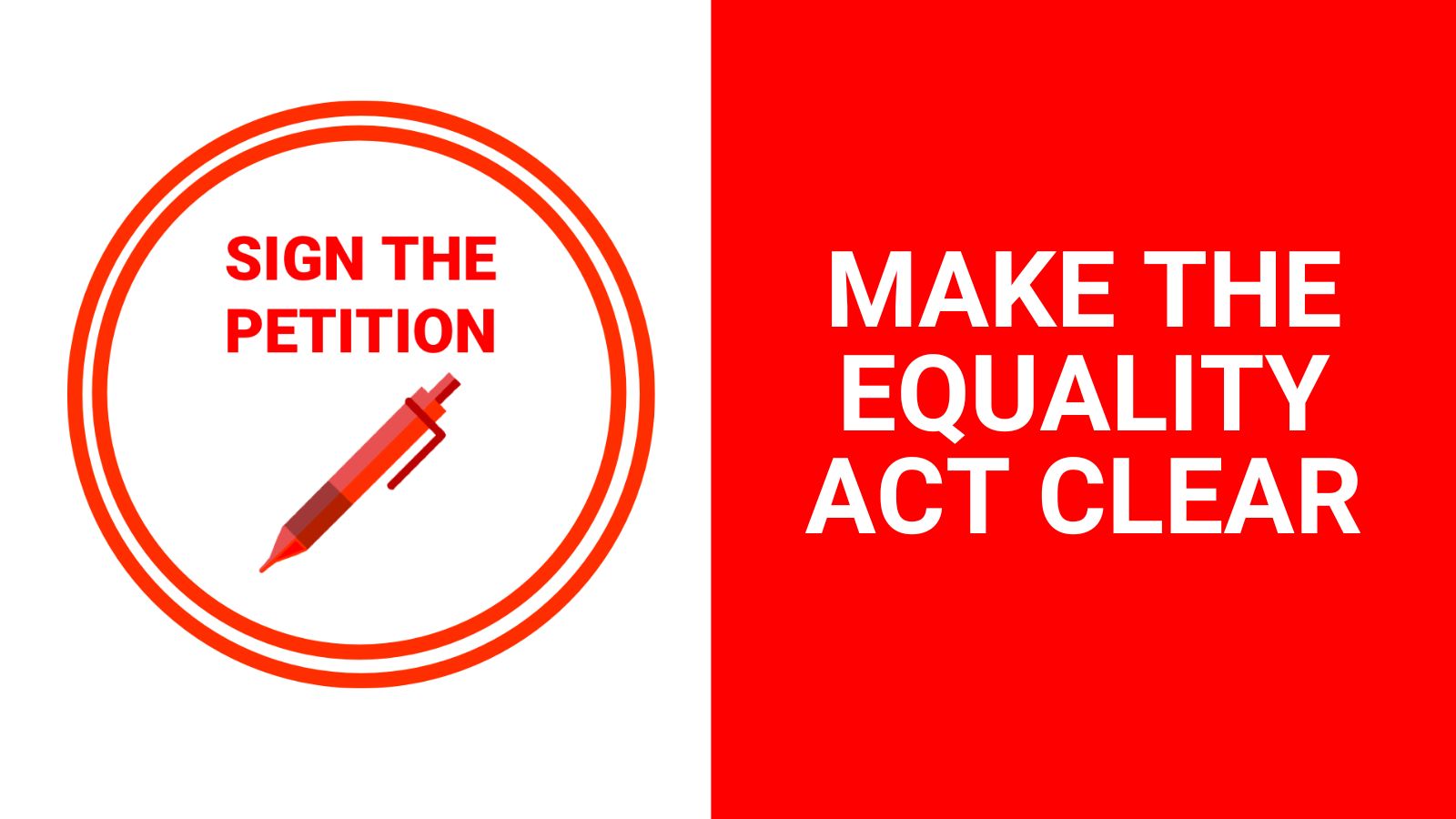Sign the petition to make the Equality Act clear
Will you join the XX,XXX people who have already signed the petition?
Your name will not be made public

Join JK Rowling and thousands of others and sign the petition calling on the government to update the Equality Act 2010 to make clear that the protected characteristic of “sex” means biological sex, and is not modified by the holding of a gender recognition certificate.
The petition is hosted by the UK Parliament official petition site. Click on the green button to get there.
What is this about?
Watch the 40-second video
Read the one-minute illustrated briefing
Download the eight-page illustrated briefing
Read our analysis of the government’s initial response
Read our Sex in the Equality Act FAQ
Further information
When the Gender Recognition Act was brought in, lawmakers recognised that it was an extraordinary piece of legislation, and that the implications of section 9, which changes a person’s legally recognised sex “for all purposes”, were unclear:
“I have never seen a statute quite in this form before. The Bill says ‘becomes for all purposes’, and it is not limited to the purposes of the Act. I do not understand what all the purposes are if they are other than the purposes of the Act.”
Lord Cambell of Alloway, House of Lords 2004
They put in a safety clause (section 23) to give governments the power to sort out any problems later. As the notes to the legislation explain:
“This power…is provided due to the entirely novel nature of this legislation. Legislation has made distinctions on the basis of gender [sex] for centuries, and the use of gender-specific terms, though it has reduced, nevertheless continues in some contexts.”
Gender Recognition Act, explanatory notes
Laws should be understandable by everyone, and this year the government recognised the need for new laws to be clear about the meaning of “sex”:
“The effect of section 9 of the Gender Recognition Act 2004 is that a reference to a ‘woman’ in legislation, without more, will include someone who is a woman by virtue of a Certificate and will not include someone who is a man by virtue of a Certificate. In some cases, this might be the desired result but in others it might not.”
Statement by Lord True and Mark Spencer MP
According to a report in the Telegraph, Prime Minister Rishi Sunak also intends to “look to review the Equality Act to make it clear that sex means biological sex rather than gender”.
We are calling on the government to do this by using the power written into the GRA to modify the operation of the Equality Act 2010 to put it beyond doubt that the terms “sex”, “male”, “female”, “man” and “woman”, for the purpose of sex discrimination laws, mean biological sex and not “sex as modified by a Gender Recognition Certificate”.
Why is this important?
The Equality Act 2010 defines nine separate protected characteristics, including “sex” and “gender reassignment”, and protects people from discrimination on grounds of those characteristics.
“Sex” and “gender reassignment” are separate protected characteristics, but there has been much confusion about how the Equality Act 2010 and Gender Recognition Act 2004 interact. This has caused uncertainty for women, transgender people, employers, schools and service providers. It has led to tensions and conflicts.
Parliamentary debate and a legislative amendment is the democratic and transparent way to clarify the law for the benefit of everyone.
Does sex mean biological sex in the Equality Act?
The Equality Act 2010 brought together dozens of previous laws on sex, race, disability and age discrimination. We believe that the intention of parliament was to continue to provide clear protection against sex discrimination for all women (meaning females), and for all men (meaning males).
This is reflected in the judgment of For Women Scotland v The Lord Advocate & Scottish Ministers [2022] CSIH 4, which found that the terms ‘woman’ and ‘man’ relate to biological sex.
This interpretation is also supported by a careful reading of the Equality Act. For example, section 13(6) of the Equality Act states that if a woman is treated less favourably because she is breastfeeding, this is sex discrimination, and that special treatment given to woman in connection with pregnancy or childbirth does not unlawfully discriminate against men. The meaning of these terms clearly relates to biological sex. Similarly, discrimination against women returning to work after having children, or against women who might get pregnant, is also considered sex discrimination.
| Freddy McConnell – a mother who identifies as a man and has a gender recognition certificate saying “Male” – is still protected against sex discrimination as a woman (female). Freddy should not be discriminated against because of breastfeeding, pregnancy or being a mother. |
The word “sex” is used in the Act in relation to sexual orientation (section 12). A person who is heterosexual or homosexual is sexually attracted to a person of the opposite sex or the same sex in the sense of biology, and not because of a government certificate they may hold.
| It is legitimate to have a service that is only for lesbians (women with the protected characteristic of homosexuality), and not to include men who identify as women and are attracted to women (even if those men have gender recognition certificates stating their “acquired gender” as female). |
Similarly, schedule 3 part 7 sets out statutory justifications for single-sex and separate-sex services. These include situations where “a person of one sex might reasonably object to the presence of a person of the opposite sex” and those where “only persons of that sex have need of the service”. These conditions make sense only if “sex” means biological sex, not the holding of a certificate. Documentation cannot alter other people’s instinctive perceptions of a person, or change a person’s sex-based needs.
| If a service is provided on a single-sex basis on the basis that a person of one sex might reasonably object to the presence of a person of the opposite sex (for example in showers or a sauna in a gym), there is no reason to think this reasonable objection would be overcome by knowing that a person of the opposite sex has an official certificate misstating their sex. |
Although further litigation might eventually resolve confusion about the meaning of the word “sex” in the Equality Act, it would be expensive and burdensome on the individuals bringing the claims. Individual judges are also wary of bringing clarity to such a politically contentious question, when faced with a specific situation.
The right place to have this debate is Parliament.
Who supports this?
The Employment Lawyers Association has stated:
“There is considerable uncertainty, and controversy, as to whether possession of a GRC makes a difference to the ‘sex’ of a person when their rights or position under the Equality Act 2010 are considered.”
It considers that
“the law in this area should be made clear by legislators”.
The Equality and Human Rights Commission has called on the UK and Scottish governments to clarify how the Equality Act 2010 will interact with the Gender Recognition Reform Act that is under debate in Scotland.
“In our view, there are implications for the operation of the Equality Act 2010 whether or not the UK Government elects to recognise Scottish GRCs obtained under the reformed system in the other nations of the UK.”
The Scottish Government recognises that the Equality Act 2010 is a reserved matter, and has said it is for Westminster to address this issue.
“If you are calling for changes to the Equality Act 2010, which covers “sex” and “gender reassignment” as protected characteristics, that would be an issue for the UK Government, as that legislation is largely reserved.”
Stonewall recognises that the protection against discrimination that the Equality Act provides for people who identify as transgender is based on the protected characteristic of “gender reassignment”, not whether or not they hold a GRC.
“Seems like a good day to remind ourselves that (however much some folks dislike it) Equality Act protections for trans people of any age *do not* depend on a) having a gender recognition cert b) having had any kind of medical intervention.”
What you can do to help
Become a Petition Champion
Can you encourage five, ten or maybe even more of your friends to sign the petition? We will send you resources, updates and advice to spread the word.
Bookmark and share our quick-start page
Order some petition cards to share
Keep some in your wallet, your bag, and at home and start conversations. If you’re already a regular donor, just give us your address and we will send you a pack of petition cards. If you’re not, please consider making a one-off donation of at least £5 when you order your cards. We can only send petition cards to UK addresses.
Put the campaign on your social media profile
Download our social media profile graphics and use them on your profiles.
Read our campaign briefing and watch the video
Have an idea on how to help?
If you have got feedback or an idea for something else we could do to help you get the word out, let us know. We can’t guarantee we will do everything, but we are open to suggestions.

